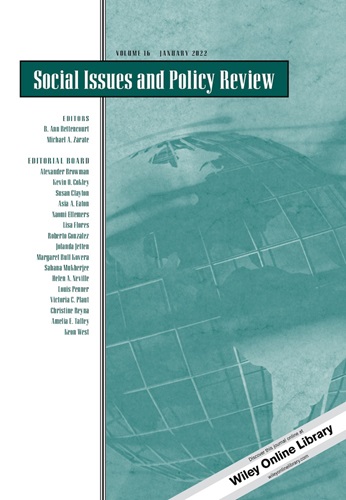从下到上解决群体间的暴力冲突
IF 5.6
1区 心理学
Q1 PSYCHOLOGY, SOCIAL
引用次数: 17
摘要
让普通公民参与暴力冲突的干预措施如何影响更广泛的冲突动态?鉴于每年都有大量资源投入到旨在促进和平的以公民为导向的项目中,这是一个重要的问题。我们开发了一个框架来分析个人层面的干预措施可以更广泛地缓解暴力冲突升级的过程。个体层面的干预可以增加参与者对外群体的积极感受,以及心理、社会和物质资源。这些因素有可能影响内部团体的治安、公共宣传和有助于和平的政治行动等行为。然而,影响冲突的干预措施的有效性受到背景因素的影响,如群体对物质资源的获取、他们在社会中的地位和政治制度。我们使用这个分析框架来评估来自最近干预研究的证据。我们发现,目前的证据基础相当小,没有涵盖相关背景的多样性,并且对使人们能够参与缓解冲突行为的资源和能力给予的关注太少。研究人员和政策制定者不应该只考虑本文章由计算机程序翻译,如有差异,请以英文原文为准。
Addressing Violent Intergroup Conflict from the Bottom Up
How might interventions that engage ordinary citizens in settings of violent conflict affect broader conflict dynamics? Given the volume of resources committed every year to citizen-oriented programs that attempt to promote peace, this is an important question. We develop a framework to analyze processes through which individual-level interventions could mitigate violent conflict escalation more broadly. Individual-level interventions may increase positive feelings toward the outgroup, as well as psychological, social, and material resources among participants. These have the potential to influence behaviors such as policing of the ingroup, public advocacy, and political action that can contribute to peace. Yet, the effectiveness of interventions to influence the conflict is moderated by contextual factors like groups’ access to material resources, their positions in society, and political institutions. We use this analytical framework to assess evidence from recent intervention studies. We find that the current evidence base is quite small, does not cover the diversity of relevant contexts, and gives too little attention to resources and capacities that enable people to engage in conflict mitigation behaviors. Researchers and policy makers should go beyond thinking only about
求助全文
通过发布文献求助,成功后即可免费获取论文全文。
去求助
来源期刊

Social Issues and Policy Review
Multiple-
CiteScore
22.20
自引率
1.10%
发文量
9
期刊介绍:
The mission of Social Issues and Policy Review (SIPR) is to provide state of the art and timely theoretical and empirical reviews of topics and programs of research that are directly relevant to understanding and addressing social issues and public policy.Papers will be accessible and relevant to a broad audience and will normally be based on a program of research. Works in SIPR will represent perspectives directly relevant to the psychological study of social issues and public policy. Contributions are expected to be review papers that present a strong scholarly foundation and consider how research and theory can inform social issues and policy or articulate the implication of social issues and public policy for theory and research.
 求助内容:
求助内容: 应助结果提醒方式:
应助结果提醒方式:


